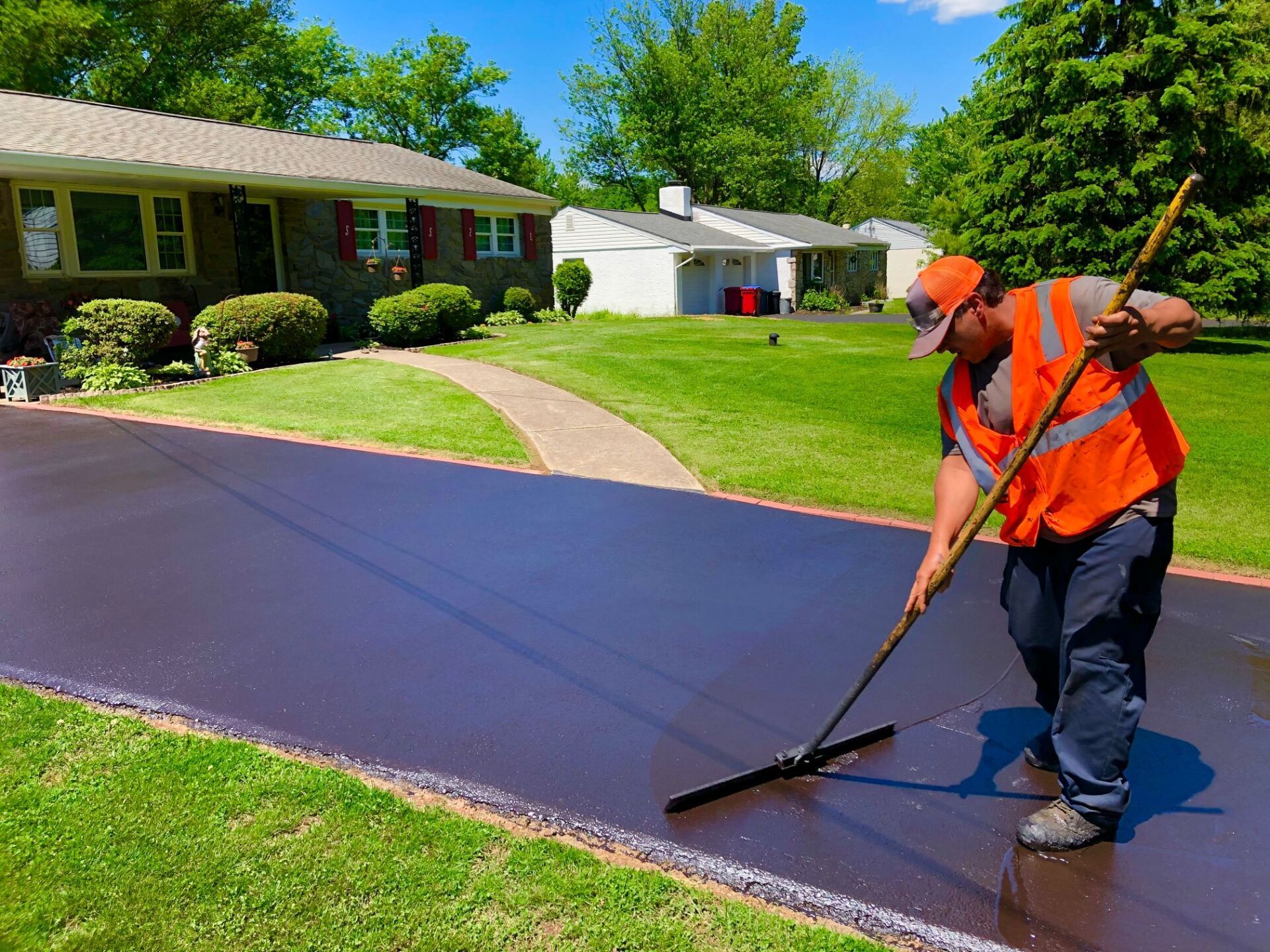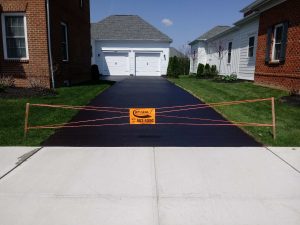Elevate Safety And Security and Charm: Angled Parking Lot Solutions with Asphalt Sealing
Wiki Article
Hot Mix Asphalt: A Sustainable Solution for Sidewalk
Hot Mix Asphalt (HMA) has actually arised as a leading lasting selection for pavement services, providing a myriad of ecological advantages and cutting-edge technologies. As the need for environment-friendly building and construction practices expands, checking out the subtleties of HMA's sustainability can provide valuable understandings right into the future of sidewalk remedies.Ecological Benefits of Warm Mix Asphalt

Moreover, Hot Mix Asphalt helps to mitigate metropolitan heat island results. Its dark color takes in sunlight, lowering the amount of warm showed back right into the atmosphere contrasted to lighter-colored sidewalks. This can reduce ambient temperature levels in metropolitan locations, lowering the need for air conditioning and ultimately decreasing energy intake.
Furthermore, Warm Mix Asphalt adds to improved stormwater monitoring. Its permeable nature permits water to infiltrate the sidewalk and charge groundwater supplies, reducing drainage and the risk of flooding. These ecological advantages make Hot Mix Asphalt a lasting option for paving freeways and roadways.
Energy Performance in HMA Production
Is power efficiency a vital aspect in the manufacturing of Warm Mix Asphalt (HMA)? Absolutely. Power plays a substantial duty in the production of HMA, influencing both expense and ecological sustainability. One vital facet of energy efficiency in HMA manufacturing is making use of warm mix asphalt (WMA) innovations (commercial parking lot paving). WMA permits the mixing and positioning of asphalt at lower temperatures compared to conventional warm mix asphalt, leading to decreased power usage during manufacturing. This procedure not only lowers gas use but additionally decreases greenhouse gas emissions, making it a more eco-friendly alternative.Additionally, innovations in plant innovations have caused even more energy-efficient HMA manufacturing processes. Modern plants are created with functions like recycled asphalt pavement (RAP) handling capacities, reliable heater systems, and improved insulation, all adding to energy savings. By enhancing power use in HMA production, the sector can minimize its carbon footprint while preserving premium sidewalk materials. Energy performance is, as a result, a critical consideration in guaranteeing the sustainability of Hot Mix Asphalt production.
Recyclability of Warm Mix Asphalt
The recyclability of Warm Mix Asphalt (HMA) is a crucial facet of its sustainability and lasting ecological influence. HMA is just one of the most recycled materials in the United States, with over 100 million lots of reclaimed asphalt pavement (RAP) being recycled every year in new sidewalk building. Recycling HMA uses numerous ecological advantages, such as lowering the demand for virgin products, lowering energy intake during manufacturing, and lowering the amount of waste sent to garbage dumps.The procedure of recycling HMA entails milling the existing sidewalk, squashing it right into smaller sized pieces, and mixing it with brand-new aggregate and asphalt binder to develop a recycled mix. This recycled mix can typically execute in addition to or also far better than traditional HMA, while needing fewer raw products and generating reduced greenhouse gas discharges. By including RAP right into brand-new sidewalk tasks, roadway firms can save natural sources, lower expenses, and minimize the ecological footprint of roadway construction and maintenance tasks. In general, the recyclability of HMA plays a substantial role in promoting sustainable practices within the sidewalk sector.

Long-Term Performance of HMA
Asphalt pavements show toughness and resilience over a prolonged duration, reflecting the long-lasting efficiency of Hot Mix Asphalt (HMA) In addition, advancements in HMA modern technology, such as the use of polymer-modified binders and warm mix asphalt, have actually better boosted the longevity and longevity of HMA sidewalks. official statement By prioritizing quality building and maintenance practices, HMA continues to confirm itself as a lasting and economical remedy for lasting sidewalk framework.
HMA: Toughness and Sustainability
Showing both longevity and sustainability, Warm Mix Asphalt (HMA) has come to be a cornerstone in the construction of lasting sidewalk facilities - regrading. HMA's toughness stems from its ability to hold up against hefty tons, rough climate condition, and high traffic volumes, making it a trustworthy choice for roadways, freeways, and flight terminal runways. The make-up of HMA, which generally consists of aggregates, here are the findings binder, and filler, plays a critical role in boosting its longevity and resistance to use and tear
Moreover, HMA's sustainability exists in its recyclability and energy-efficient manufacturing procedure. The ability to recycle recovered asphalt sidewalk (RAP) in new HMA combinations minimizes the need for virgin materials and lessens the ecological impact of pavement building and maintenance. Furthermore, the energy effectiveness of generating HMA depends on its reduced blending temperature levels compared to other pavement products, bring about minimized energy usage and greenhouse gas emissions.
Verdict
Finally, hot mix asphalt (HMA) uses a sustainable solution for pavement with its eco pleasant features. HMA's recyclability, power performance in production, and long-term sturdiness make it an environmentally friendly choice for roadway building. By preserving all-natural resources, lowering waste, and decreasing greenhouse gas exhausts, HMA plays a vital role in promoting sustainability in facilities advancement. Its capability to minimize urban warm island results even more underscores its significance in producing resilient and ecologically mindful sidewalk systems.
HMA is one of the most recycled products in the United States, with over 100 million loads of redeemed asphalt pavement (RAP) being reused annually in brand-new sidewalk building and construction.The process of recycling HMA entails crushing the existing pavement, crushing it into smaller items, and mixing it with brand-new accumulation and asphalt binder to produce a recycled mix.Asphalt sidewalks demonstrate durability and resilience over an extensive duration, mirroring the lasting efficiency of Warm Mix Asphalt (HMA) Furthermore, improvements in HMA modern technology, such as the usage of polymer-modified binders and warm mix asphalt, have actually additionally enhanced the sturdiness and long life of HMA pavements. The capability to recycle redeemed asphalt pavement (RAP) in new HMA combinations have a peek here reduces the need for virgin materials and lessens the ecological impact of pavement building and maintenance.
Report this wiki page